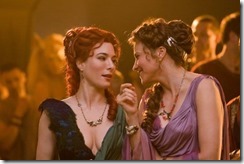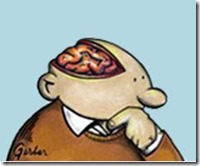Lucy’s in a new The Partially Examined Life podcast – check out the details below and click on the link to download the podcast
Podcast: Play in new window | Download (Duration: 1:24:46 — 77.7MB)
An unrehearsed, dramatic read-through of the text we'll be discussing on ep. 117, a Greek tragedy written around 441 BCE, telling the myth of the cursed line of Oedipus, mother-f*#king king of Thebes. Featuring Mark, Seth, Wes, and Dylan, plus special guest starts Lucy Lawless as Antigone, Paul Provenza as Creon, Alice Sinclair as Ismene, and John Castro as Haimon. After the performance, the cast discusses the conventions of Greek tragedy, our selected translation, and a little about why philosophers should be interested in this. Read more about the topic and get the text to read along. Want to get this ad-free, with an extra several minutes of discussion plus wacky outtakes? Become a PEL Citizen! It's a great way to support the podcast. We also accept donations. End song: "Antigone (Choragos Speaks)" by Mark Lint. Read about it. Sponsors: Intuit Quickbooks: visit tryselfemployed.com/PEL. Also see thegreatcourses.com/PEL, for massive discounts on great lectures. Antigone image by Genevieve Arnold.
MORE OF LUCY’S PODCASTS WITH THE PEL TEAM
 Back in October (Oct 7) The Partially Examined Life site released a 2 hour podcast they did with Lucy on the subject of fame. This was such an interesting podcast. It was unfortunate for non English speaking fans that some could not understand all of the podcast. I was asked by several fans if a transcript existed. I contacted the guys from Partially Examined Life and asked. Unfortunately there wasn't a transcript. I received a very cool email this afternoon from Seth from the Partially Examined Life site to say they did have an transcript that I could share with the fans! Many thanks to Seth and the team at Partially Examined Life for this wonderful transcript!
Back in October (Oct 7) The Partially Examined Life site released a 2 hour podcast they did with Lucy on the subject of fame. This was such an interesting podcast. It was unfortunate for non English speaking fans that some could not understand all of the podcast. I was asked by several fans if a transcript existed. I contacted the guys from Partially Examined Life and asked. Unfortunately there wasn't a transcript. I received a very cool email this afternoon from Seth from the Partially Examined Life site to say they did have an transcript that I could share with the fans! Many thanks to Seth and the team at Partially Examined Life for this wonderful transcript!
It's in PDF format and quite lengthy.
READ THE TRANSCRIPT
LISTEN TO THE PODCAST
- Podcast: Play in new window | Download (Duration: 2:03:11 — 112.8MB)
On Fame: What the Classics Tell Us About Our Cult of Celebrity by Tom Payne (2010).
What’s the deal with our f’ed up relationship with celebrities? Payne says that celebrities serve a social need that’s equal parts religion and and aggression. TV’s Lucy Lawless (Xena, Spartacus, Battlestar Galactica) joins us to discuss the accuracy of this thesis, along with her obsession with philosophy (and our podcast), the relation between fandom and mental illness, the drive for fame, sacrificial heroes, celebrity encounters, fame for fame’s sake, infamy, celebrity philosophers, mentally ill philosophers, and what Nietzsche’s will to power has to do with all of this.
 The Partially Examined Life Blog present their second annual dramatic reading of a work of philosophical theatre. – 2 January 2014
The Partially Examined Life Blog present their second annual dramatic reading of a work of philosophical theatre. – 2 January 2014
Mark Linsenmayer and Wes Alwan are joined by real actresses Lucy Lawless (Xena,Battlestar Galactica, Parks & Recreation, etc.) and Jaime Murray (Defiance, Dexter,Warehouse 13, etc.), who are pals through working together on Spartacus.
Warning: This is a cold read, not a rehearsed production, for educational purposes only (meaning you’re not allowed to have fun listening to this, I guess). Also, the ladies’ sound quality is a bit lo-fi by fault of their crummy mics and Skype.
Listen to the show here or download the file 80 mb and time: 1:27:11
Read the script (courtesy of vtheatre.net)
NO EXIT
(Courtesy of Wikipedia)
No Exit is a 1944 existentialist French play by Jean-Paul Sartre. The original title is the French equivalent of the legal term in camera, referring to a private discussion behind closed doors; English translations have also been performed under the titles In Camera, No Way Out, Vicious Circle, Behind Closed Doors, and Dead End. The play was first performed at the Théâtre du Vieux-Colombier in May 1944.[1]
The play is a depiction of the afterlife in which three deceased characters are punished by being locked into a room together for eternity. It is the source of Sartre's especially famous and often misinterpreted quotation "L'enfer, c'est les autres" or "Hell is other people", a reference to Sartre's ideas about the Look and the perpetual ontological struggle of being caused to see oneself as an object in the world of another consciousness
SYNOPSIS
Three damned souls, Joseph Garcin, Inès Serrano, and Estelle Rigault, are brought to the same room in Hell and locked inside by a mysterious valet. They had all expected torture devices to punish them for eternity, but instead find a plain room furnished in the style of the Second French Empire. At first, none of them will admit the reason for their damnation: Garcin says that he was executed for being a pacifist, while Estelle insists that a mistake has been made; Inès, however, is the only one to demand that they all stop lying to themselves and confess to their moral crimes. She refuses to believe that they have all ended up in the room by accident and soon realizes that they have been placed together to make each other miserable; she deduces that they are to be one another's torturers. Garcin suggests that they try to leave each other alone and to be silent, but Inès starts to sing about an execution and Estelle vainly wants to find a mirror to check on her appearance. Inès tries to seduce Estelle by offering to be her "mirror" by telling her everything she sees, but ends up frightening her instead. It is soon clear that Inès is attracted to Estelle, Estelle is attracted to Garcin, and Garcin is in no mood for sexual behavior.
After arguing, they decide to confess to their crimes so they know what to expect from each other. Garcin cheated on and mistreated his wife; Inès seduced her cousin's wife while living with them; and Estelle had an affair and then killed the resulting child, prompting the child's father to commit suicide. Despite their revelations, they continue to get on each other's nerves. Garcin finally begins giving in to the lascivious Estelle's escalating attempts to seduce him, which drives Inès crazy. Garcin is constantly interrupted by his own thought, though, and begs Estelle to tell him he is not a coward for attempting to flee his country during wartime. While she complies, Inès tells him that Estelle is just feigning attraction to him so that she can be with a man—any man. This causes Garcin to abruptly attempt an escape. After trying to open the door repeatedly, it inexplicably and suddenly opens, but he is unable to bring himself to leave, and the others remain as well. He says that he will not be saved until he can convince Inès to trust in him. She refuses, saying that he is obviously a coward, and promising to make him miserable forever. Garcin concludes that rather than torture devices or physical punishment, "hell is other people." Estelle tries to persevere in her seduction of Garcin, but he says that he cannot make love while Inès is watching. Estelle, infuriated, picks up a paper knife and repeatedly stabs Inès. As they are all already dead, this attack does nothing and Inès even halfheartedly stabs herself, beginning to laugh. As Estelle comments on the idea of their being trapped here forever and laughs too, all three join in prolonged fit of laughter before Garcin finally concludes, "Eh bien, continuons" (roughly "Eh well, let's continue on...").
Characters
Joseph Garcin – cowardice and callousness caused his young wife to die "of grief" after his execution He deserted his unit in World War II, and he was unfaithful to his wife – he even brings his affairs home and gets her to make them coffee in bed, without any sympathy. Initially, he hates Inès because she understands his weakness, and wants Estelle because he feels that if she treats him as a man he will become manly. However, by the end of the play he understands that because Inès understands the meaning of cowardice and wickedness, only absolution at her hands can redeem him (if indeed redemption is possible).
Inès Serrano – Inès is the second character to enter the room. A lesbian postal clerk, she turned a wife against her husband, twisting the wife's perception of her spouse and the subsequent murder of the man (who is Inès' cousin). Indeed, Inès seems to be the only character who understands the power of opinion, manipulating Estelle's and Garcin's opinions of themselves and of each other throughout the play. She is honest about the evil deeds she, Garcin, and Estelle have done. She frankly acknowledges the fact that she is a cruel person.
Estelle Rigault – Estelle is a high-society woman, a blonde who married an older man for his money and had an affair with a younger man. To her, the affair is merely an insignificant fling, but her lover becomes emotionally attached to her and she bears him a child. She drowns the child by throwing it into the lake, which drives her lover to commit suicide. Throughout the play she tries to get at Garcin, seeking to define herself as a woman in relation to a man. Her sins are deceit and murder (which also motivated a suicide). She lusts over "manly men", which Garcin himself strives to be.
Valet – The Valet enters the room with each character, but his only real dialogue is with Garcin. We learn little about him, except that his uncle is the head valet, and that he does not have any eyelids, which links to Garcin because Garcin's eyelids are atrophied.
